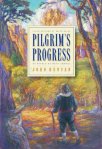 My younger brother’s thirteen year old daughter, Eilise, has been diagnosed with a pinealblastoma: an aggressive brain tumor. After hanging up the phone, having heard the news through my brother’s breaking voice, and our short but meaningful tear-filled conversation, I was reminded once again of The Pilgrim’s Progress. The Pilgrim’s Progress is a Christian allegory that was written by John Bunyan, and published in February 1678.
My younger brother’s thirteen year old daughter, Eilise, has been diagnosed with a pinealblastoma: an aggressive brain tumor. After hanging up the phone, having heard the news through my brother’s breaking voice, and our short but meaningful tear-filled conversation, I was reminded once again of The Pilgrim’s Progress. The Pilgrim’s Progress is a Christian allegory that was written by John Bunyan, and published in February 1678.
I began thinking particularly of a couple sections. First, when night is falling, and Christian has entered the Valley of the Shadow of Death. Christian finds himself in the middle of the valley amidst gloom and terror, but then he hears the words of the Twenty-third Psalm: “Yea, though I walk through the valley of the shadow of death, I will fear no evil: for thou art with me; thy rod and thy staff they comfort me.” Christian makes it through the night trusting that God is with him. Then, he leaves valley as the sun rises on a new day.
The second is when Christian and Hopeful, having just visited Vanity Fair, are traveling along a particularly rough section of road. They leave the highway to travel on the easier By-Path Meadow. However, there is a rainstorm that forces them to spend the night, and in the morning, they are captured by Giant Despair who takes them to his Doubting Castle where they are imprisoned, beaten and starved. The Giant Despair wants them to commit suicide, but they endure his misery until Christian realizes that he has a key called Promise, which will open all the doors and gates of Doubting Castle. Using the key, they escape. Eventually, Christian and Hopeful come upon some shepherds in the Delectable Mountains. And the shepherds show them some of the wonders of the place also known as “Immanuel’s Land.”
What a helpful allegory for the Christian life. I love The Pilgrim’s Progress for several reasons. However, the one I will highlight today is that this story reminds us that our lives are all pilgrimages, or journeys, or voyages. And all pilgrimages, journeys, or voyages have real danger, and put us in real peril. However, for the Christian, the peril is never experienced apart from God’s grace. Oh, for more grace!
 Here is a Puritan prayer entitled “Voyage.” I have posted this before. However, it is the prayer that I immediately think of when my friends or family find themselves in the midst of this life’s raging storms. So, today I pray this for my brother and his family, and to The Lord of the Oceans!
Here is a Puritan prayer entitled “Voyage.” I have posted this before. However, it is the prayer that I immediately think of when my friends or family find themselves in the midst of this life’s raging storms. So, today I pray this for my brother and his family, and to The Lord of the Oceans!
O Lord of the Oceans,
My little bark sails on a restless sea, grant that Jesus may sit at the helm and steer me safely; suffer no adverse currents to divert my heavenward course; let not my faith be wrecked amid storms and shoals; bring me to harbour with flying pennants, hull unbreached, cargo unspoiled.
I ask great things, expect great things, shall receive great things. I venture on thee wholly, fully, my wind, sunshine, anchor, defense.
The voyage is long, the waves high, the storms pitiless, but my helm is held steady, thy Word secures safe passage, they grace wafts me onward, my haven is guaranteed. This day will bring me nearer home, grant me holy consistency in every transaction, my peace flowing as a running tide, my righteousness as every chasing wave.
Help me to live circumspectly, with skill to convert every care into prayer, halo my path with gentleness and love, smooth every asperity (harshness) of temper; let me not forget how easy it is to occasion grief; may I strive to bind up every wound, and pour oil on all troubled waters. May the world this day be happier and better because I live.
Let my mast before me be the Saviour’s cross, and every oncoming wave the fountain in His side. Help me, protect me in the moving sea until I reach the shore of unceasing praise.
In the words of the great hymn writer, Isaac Watts, “O God, our help in ages past, our hope for years to come, our shelter from the stormy blast, and our eternal home.” ~ O God, Our Help in Ages Past ~ by Isaac Watts, 1719.
My brother, may our faithful God grace you on your pilgrimage, and shelter you in the midst of your current storm.








